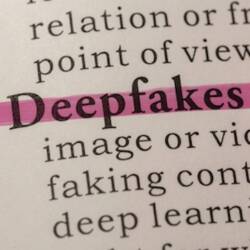AI’s Got Your Back: Chatbot Helps Users Deal With Emotional/Sexual Rejection
Who you gonna call—when someone ghosts you?

Whether it’s ruining male-identified person’s lives (The Hill), possibly causing irreparable emotional harm (Psychology Today), or enabling violent misogyny (Futurism), AI companions seem to have been a more negative, less positive idea.
But what if chatbots weren’t just enabling the silent epidemic of loneliness in an entire generation of young men,” or contributing to “loneliness because they dissuade users from entering into real-life relationships,” or trapping people in “cycle of abuse that often characterizes real-world abusive relationships,” thanks to an innovative new chatbot designed to aid people in managing human relationships?
Specifically, Closure provides advice on how to cope with rejection, “75M Americans have experienced ghosting. Chat with an AI version of a person who went no-contact with you. Get your answers—and believe in yourself again.”
Moving on, living well
Still in open beta, Closure has already garnered a lot of pre-release buzz, largely due to its developer’s Reddit ads heralding the chatbot as an effective tool for dealing with the end of a relationship.
Speaking to 404Media, Anna Iokhimovich, Closure’s founder and CEO, revealed an incident from her own life fueled the chatbot’s creation, “I was ghosted by a fiancé, probably my worst blow, a best friend, and numerous recruiters (once, after 6 rounds of interviews!)”
RECOMMENDED READ: Yes, And…Maybe Not: Why Erotic Chatbots May Need Guardrails
Closure offers a series of different ghosting scenarios to help users process: Long Term Partner, “A significant other or spouse stopped responding;” Date Partner, “Someone you were dating disappeared;” Friend, “A friend stopped responding to your messages,” and Recruiter, “company stopped responding.”
After selecting one of the four, users then add their pertinent details, such as the name of the ghoster, their age, and “What They Used To Call You” — which, when you think about it, is a pleasantly gentle alternative to the usual “Your Name Here.”
Once everything is filled in, the chatbot then assumes the ghoster’s role, allowing users to voice their frustration and hopefully feel at least a little better about the unresolved situation.
Opening up about Closure
So far, the chatbot has received a respectable number of positive Product Hunt reviews, with several noting how surprisingly useful it was.
For instance, Maria Lustsikov posted, “Closure gave me an outlet to convey my feelings, be angry with, get some type of explanation and I felt surprisingly content after that very ex was being apologetic and “explained ‘himself” through Closure.”
Nirvana Guha agreed, sharing, “I was in a 4+ year relationship with a woman who just ghosted me and I never got over it. Using Closure gave me… well, CLOSURE. I was able to vent and scream all I wanted.”
Good start, long way to go
Curious, I gave Closer a try, and while supportive of its mission, I found the experience somewhat superficial. For instance, right off the bat, the Recruiter began apologizing for not responding, which, as anyone who has ever had to deal with business relationships, something which real life recruiters hardly ever do.
Unfortunately, the same was true for Friend, as well. Not that I expected a genuine, human-mirroring interaction, but it was disappointing, considering the AI was made and advertised for this specific purpose.
Considering this, like a high percentage of other chatbots, Closure will likely remain a work-in-progress—its developers tweaking, adjusting, and improving it. Nevertheless, its potential benefits definitely outweigh its current shortcomings.
More than worthwhile
As we’ve reported many times previously and will likely continue to do so for the foreseeable future, the path to emotionally fulfilling human-AI interactivity is a long and rocky one.
Unlike The Hill, Psychology Today, Futurism, or the numerous other doomsayers, we acknowledge that while today’s chatbots may be less-than-perfect, they are—on the whole—headed in the right direction.
Case in point, Closer may not have made me feel better, but if its glowing Product Hunt reviews are anything to go by, it’s well on its way to meeting many people’s emotional needs.
More importantly, it might usher in a new wave of emotionally supportive chatbots, ones perhaps uniquely designed for all sorts of specific issues, such as addiction recovery, trauma therapy, anti-anxiety treatments, gender validation, and sexuality-related assistance, to name but a few.
In the meantime, Closer might be what many people desperately need: someone, or something, to talk to—especially when no one’s talking to us.
Image Sources: Depositphotos

















